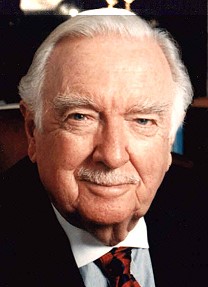And that's the way it is, Monday, January 16, 2006

"It's my belief that we should get out now."
- Former CBS anchor WALTER CRONKITE, whose 1968 conclusion that the Vietnam War was unwinnable keenly influenced public opinion then, said Sunday he'd say the same thing today about Iraq.
Cronkite Urges News Anchors To Push Withdrawal
By Glenn Garvin
Miami Herald
PASADENA, Calif. -- Television news anchors should be calling for U.S. troops to withdraw from Iraq, former CBS newsman Walter Cronkite said Sunday, remembering his own editorial demand for American withdrawal from Vietnam as one of the proudest moments of his career.
Cronkite also called his successor, Dan Rather, "a victim" in the 2004 scandal over a CBS story on President Bush's Vietnam-era National Guard service that led to the dismissals of several CBS staffers and hastened Rather's retirement.
Rather was "a man who had done a great job over many years" who relied too much on an errant producer, Cronkite said. Producer Mary Mapes, who was fired for her role in the story based on documents that were later revealed to be fakes, "messed up on one aspect . . . and that was the authenticity of a source," Cronkite said.
"We all felt sorry for him coming to the end of his career and having that kind of a story spinning around him."
Cronkite made his remarks during an appearance before North American TV critics here to promote an upcoming special on his career that airs later this year on PBS.
And nothing in his career, he said, topped his startling editorial on Vietnam.
"One of those [moments] that I'm proudest of was the editorializing that I did on the Tet offensive in Vietnam and, I think, helped speed the end of the war," he said.
If he were still anchoring, Cronkite said, he would have taken advantage of the damage wreaked on the United States by Hurricanes Katrina and Wilma last fall to tell the nation it was time to bring American troops home from Iraq.
"What I would like to have said at that moment," he said, was "that Mother Nature had not treated us well" and the money being spent on the war in Iraq would have to be used instead "to help rebuild some of our important cities of the United States. And therefore we are going to have to bring our troops home."
Journalists can deliver their opinions with the news as long as they're clearly labeled, Cronkite added.
"If an individual reporter has gained a reputation of being honest, fair as can be, and helps the American people in trying to make a decision on a major issue, I think we ought to take that opportunity," he said.
Cronkite certainly did when he delivered the most influential editorial in U.S. broadcast history at the end of a CBS newscast on Feb. 27, 1968, following a bloody Viet Cong attack known as the Tet Offensive.
"To say that we are closer to victory today is to believe, in the face of the evidence, the optimists who have been wrong in the past. . . . It is increasingly clear to this reporter that the only rational way out then will be to negotiate, not as victors, but as an honorable people who lived up to their pledge to defend democracy, and did the best they could," he told his audience.
President Johnson, watching the broadcast, turned to aides and said, "If I've lost Cronkite, I've lost Middle America."
A month later, Johnson announced he would not run for reelection and offered to negotiate with the North Vietnamese government.
Cronkite said he believes Johnson had already decided to retire and the editorial was just "another bullet in his rear end."
Oddly, he added, Johnson never complained to him about the editorial, even though the president was notorious for calling CBS to browbeat him right in the middle of his evening newscast.
'My poor secretary there who picked up the phone when we were on the air . . . would say, 'Well, he's on the air, Mr. President,' " Cronkite recalled. '[Johnson would reply], 'Goddamn it, I know he's on the air. Get him on there.' And she would have to put up with this shouting until actually I was off the air."
Cronkite retired in 1984 after 34 years at CBS, the last 19 as anchor of The CBS Evening News. At 89, he's unsteady on his feet and needs a powerful hearing aid to engage in conversation.
But he appeared to enjoy the anarchic hustle and bustle of the press conference with the TV critics, particularly when they tried to shout one another down to ask him a question.
Cronkite consoled one critic who lost such a shouting match with an anecdote about World War II military briefings he attended with Homer Bigart, who won two Pulitzer Prizes as a war correspondent for the old New York Herald Tribune.
"An incredible reporter and a great writer, but he had a terrible stutter, a terrible stutter," Cronkite recalled of Bigart.
During briefings, he simmered in frustration as other reporters overrode his stammered questions.
"We all waited for the moment in every press conference when Homer suddenly would throw his hands into the group and say, 'W-w-wait a g-g-g-g-goddamn m-m-m-minute," Cronkite remembered.

Comments